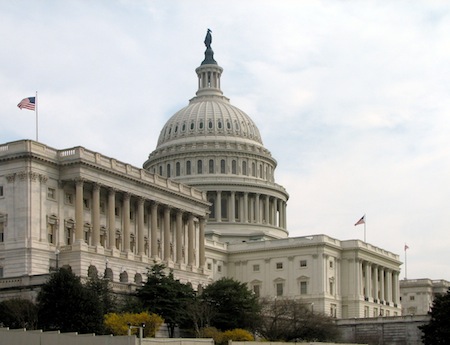FBI Director Comey: Warrant-Proof Spaces Are Problematic
The smarter way to stay on top of the multichannel video marketplace. Sign up below.
You are now subscribed
Your newsletter sign-up was successful

FBI director James Comey said the agency’s push to get more help from Apple in the San Bernardino shooting investigation is about that case, period, but added that a conversation is necessary about the broader issue of warrant-proof spaces.
That came in a House Judiciary Committee hearing in which members of the committee had some tough questions for the director and the agency's effort to force Apple to help investigators access information on an iPhone belonging to one of the alleged San Bernardino shooters.
Both sides of the aisle had tough questions about the issue, including the case-specific details and the broader issues of encryption and privacy.
Comey said balancing the privacy and public safety was the hardest issue he had faced in government, and that ultimately Congress would likely need to address the broader issue.
But he defended the FBI's use of a legal maneuver, the All Writs Act dating from 1789, to force Apple's compliance with a court order that it create what Apple called a backdoor to its encryption and Comey described somewhat differently.
He said the FBI was not looking for Apple to create a back door. He suggested the front door would do, but that Apple had to call off the drooling guard dog so the FBI could try to pick the lock.
Rep. John Conyers (D-Mich.), ranking member of the committee, and Rep. Bob Goodlatte (R-Va.), chairman, both expressed concerns that once Apple had complied, the FBI would not stop there, and that other phones' encrypted data would be compromised.
The smarter way to stay on top of the multichannel video marketplace. Sign up below.
Comey conceded that the case could provide precedent for asking for similar access to other encrypted phones the FBI possesses as part of other investigations, but that that would still require going to court with that fact set.
He also said that in the San Bernardino case, Apple had been cooperative up to a point, beyond which it did not feel it could do what the FBI wanted. At that point, Comey said, the agency used all legal means at its disposal to get the information, and that if he had not done that he should be fired.
Comey made the point repeatedly that for him, the San Bernardino case was about that particular investigation, but that there was a larger conversation to be had about encryption.
He said he saw a time when all info was encrypted, including that of pedophiles and terrorists, and that if the country wanted warrant-proof spaces, there needed to be a conversation about the implications of that.
"The FBI is not an alien force imposed upon America by Mars," he said. His job was to tell people there was a problem with encryption when it came to investigating crimes. "If there are warrant proof spaces," he said, there needs to be broader conversation about what the consequences of that are."
Rep. Conyers said he felt the FBI was doing an end run on encryption by going the court route, and said he hopedg law enforcement was not trying to leverage a tragedy to achieve a policy change. .
Comey again said efforts to unlock the San Bernardino phone were about that case and that investigation.
Rep. Darrell Issa (R-calif.), who has a security background in the private sector, arguably hammered Comey hardest. He suggested the FBI might not have done enough to access the phone information without forcing a third party, Apple, to do the work for it. Comey said that if investigators had been able to do it themselves, he wouldn't be there, but added that if Issa had any suggestions he hoped his FBI people were listening.
Rep. Steve Chabot (R-Ohio) said that he thought Congress would eventually have to resolve the issue of the limits of privacy in a tech-driven world.
Contributing editor John Eggerton has been an editor and/or writer on media regulation, legislation and policy for over four decades, including covering the FCC, FTC, Congress, the major media trade associations, and the federal courts. In addition to Multichannel News and Broadcasting + Cable, his work has appeared in Radio World, TV Technology, TV Fax, This Week in Consumer Electronics, Variety and the Encyclopedia Britannica.

